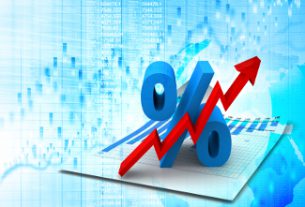Investing money make many people nervous. Especially when your life savings are at stake, the thought of losing any money, let alone thousands or tens of thousands of dollars, is enough to make you think twice about putting any of your assets at risk. But investment ultimately is necessary in order to build up wealth. Sticking money under a mattress or stashing it away at the bank isn’t any way to build up wealth. Because of inflation over time, that money will just lose its purchasing power. Investing, especially if it’s done with the aim of saving for retirement, requires a long-term focus and strategy that aims to maximize your wealth a long ways down the road.
Ignore the Short Term
It’s far too easy for many investors to get caught up in paying attention to short-term market fluctuations. Too much of the financial press is focused on that too. They have pages to fill and article quotas to meet, so they have to keep writing about why this stock rose today and that other one fell. To a certain extent their target audience consists of day traders and finance professionals who have the interest in and ability to make large changes to their portfolios at a moment’s notice.
But investment for a professional trader has a far different focus than for someone building up wealth for retirement. The professional trader is trading other people’s assets, or his company’s assets, sometimes tens or hundreds of millions of dollars at a time. Relatively small swings in the price of a particular stock on a certain day can net him millions of dollars in gains. And holding a stock only for a couple of months in order to gain a few percentage points may reap considerable gains too.
For the average investor, however, constantly trading stocks like that is counterproductive. The time, effort, and cost to constantly readjust an investment portfolio just isn’t worth it. So rather than focusing on what the Dow Jones is doing today, or what Apple’s 2nd quarter financial results report will say, you need to take a longer-term focus.
Where Do You Want to Be Five Years From Now?
If you’ve ever interviewed for a job, you’ve probably been asked where you envision yourself five or ten years from now. And while that’s a good question to think about with regard to your career, it’s just as important when thinking about your investments. If you have $50,000 saved up right now, what do you want that sum to be 5, 10, 20, or 30 years from now?
Estimate how much you’ll be able to save each month and what your expected rate of return will be. Constantly reassess every year how you’re making progress. And if you fall short of your expectations, do you have a plan to catch up?
Planning for retirement can’t be haphazard, it requires focus and discipline. The first step is cutting back on frivolous expenses to save as much money as you can, and the second is to develop a plan for how to invest that money. Once you’ve done that, then you can start thinking about how you’re going to allocate those assets across a wide variety of potential investment choices.
Choose Assets With a Long-Term Focus
Part of the long-term focus of investing means figuring out what type of investments to invest in. While stocks and bonds remain the default option for most investors, they aren’t the only options. Many more investors are starting to branch out into alternative investments such as gold and silver, cryptocurrencies, or funds that invest in real estate, commodities, overseas firms, and other assets that for decades were beyond the reach of all but the most sophisticated investors.
It’s up to you as the investor to assess where you think these assets will be 5, 10, 20, or 30 years from now and how they will help your portfolio over time. If you think that stocks are overvalued right now and due for a correction, and that bonds will lose value due to rising interest rates, how will you allocate the assets in your portfolio to account for that? Will you look for blue-chip stocks of businesses whose industries will remain resilient in the face of economic crisis? Will you focus on stocks that paid dividends throughout the last financial crisis? Will you hedge your portfolio by investing in gold or Bitcoin?
Looking at the performance of stocks this century doesn’t inspire confidence, as both the Dow Jones and S&P 500 average annualized returns of less than 5%. Gold, by comparison, has grown at nearly double that rate. Do you believe that stocks will break out of their funk and return to the growth rates they saw during the ‘80s and ‘90s? Do you believe that gold will fail to perform like it has for the past several centuries? Ultimately it is your decision what to invest in, and your predictions about the future, that will inform your investment decisions and the performance of your portfolio.
This article was originally posted on Goldco.





